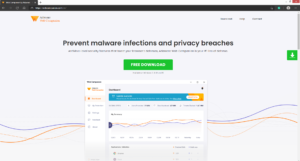Should you delete Web Companion
Web Companion by Adaware is advertised as a browser security program that will protect users when they’re browsing. However, it’s classified as a potentially unwanted program by anti-virus software, mainly due to its installation via software bundling. It’s not classified as a malicious program nor should it directly harm your computer, but if you do not remember installing it, we suggest you remove Web Companion from your computer.
Is Web Companion harmful?
It should first be said that Web Companion by Adaware is not a malicious program so it will not actively try to harm your computer. It’s advertised as a tool for safer and more private browsing, though whether it actually does that is debatable. According to its official website, it will warn you about dangerous/phishing websites you’re about to enter, will stop websites and ads from tracking you, and will work as an adblocker program. That certainly sounds like a useful program to have, but if you cannot recall installing it, do not allow it to remain.
Web Companion will also make changes to your browser’s settings. If you didn’t install it knowingly, these changes are essentially made without permission. It will change your default search engine, though it at least does not push any questionable search engines. Rather, it will likely set Bing as your default one. You won’t be able to undo any changes as long as the program remains installed.
While Web Companion is not a dangerous program, we should mention that it will track your browsing and collect certain information. In particular, the program will collect data related to what sites you visit, what you search for, what content you interact with, your IP address, etc. This isn’t exactly personal information but the program’s data collection practices are still intrusive enough to warrant removal if you get nothing in return.
How do PUPs install?
Potentially unwanted programs are installed by users themselves, whether they do it knowingly or not. Some programs are disguised to look like they’re useful and users end up installing them knowingly. Those free download websites are full of these kinds of programs and it’s very easy to fall for their false promises. To avoid filling up your computer with unwanted programs, always research programs before installing them. A simple search with Google would provide results revealing whether it’s better to not install a program.
The program also has an official website where you can download it from but again, a search of the program with Google would give plenty of results advising against keeping it.
If you cannot recall installing Web Companion, it’s possible that it was installed via software bundling. Software bundling essentially allows programs like Web Companion to come attached to other programs as additional offers. These offers are optional but they are set to install alongside automatically. This does not require permission from users, nor are they even informed about this installation. Essentially, this method allows programs to sneak in, which is why it’s so popular among unwanted program developers.
The offers that come attached to freeware are optional so you can prevent their installation, provided you pay enough attention when installing programs to notice them in the first place. To make the offers visible, you need to opt for Advanced (Custom) settings. Those settings will make all added offers visible, as well as allow you to deselect all of them. Uncheck all boxes and only then continue installing the program.
Some of those offers may seem useful at first but we would not recommend installing any of them. Software bundling is a rather sneaky installation method and programs using are essentially trying to sneak in without your permission, which is not something you should allow.
Unchecking a couple of boxes takes only a couple of seconds while uninstalling pesky potential infections like PUP would take much longer. So unless you want to fill your computer with junk programs, always pay attention when installing free programs and deselect everything that has been added. This is especially the case with programs you download from non-official websites.
Web Companion removal
Because it’s not a malicious program, you should be able to remove Web Companion fairly easily. The easiest way to delete Web Companion would be by using anti-virus software. Numerous anti-virus programs detect it as a potential threat so you can use any of them. However, you should also be able to uninstall Web Companion manually, without any problems. Though if you have very little experience with uninstalling programs, it would be easier to use anti-virus software.
Site Disclaimer
WiperSoft.com is not sponsored, affiliated, linked to or owned by malware developers or distributors that are referred to in this article. The article does NOT endorse or promote malicious programs. The intention behind it is to present useful information that will help users to detect and eliminate malware from their computer by using WiperSoft and/or the manual removal guide.
The article should only be used for educational purposes. If you follow the instructions provided in the article, you agree to be bound by this disclaimer. We do not guarantee that the article will aid you in completely removing the malware from your PC. Malicious programs are constantly developing, which is why it is not always easy or possible to clean the computer by using only the manual removal guide.

